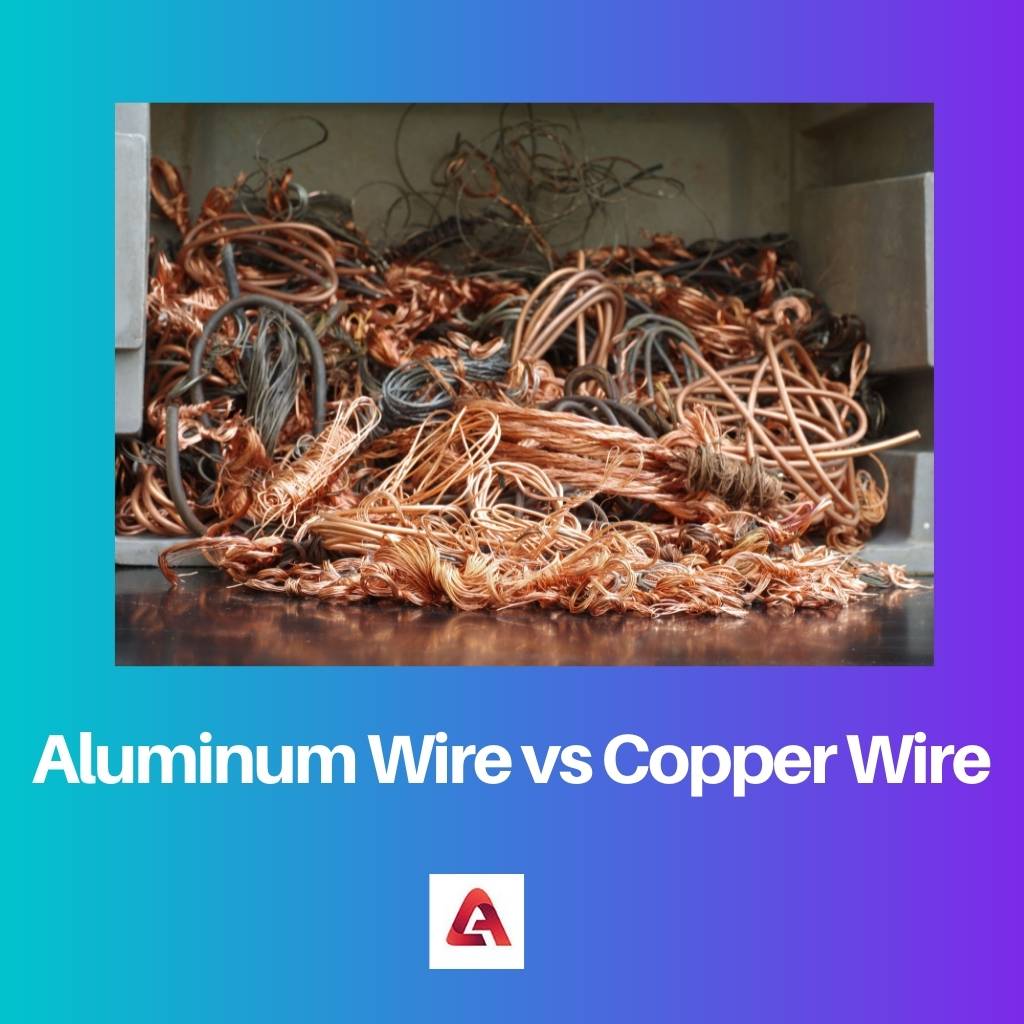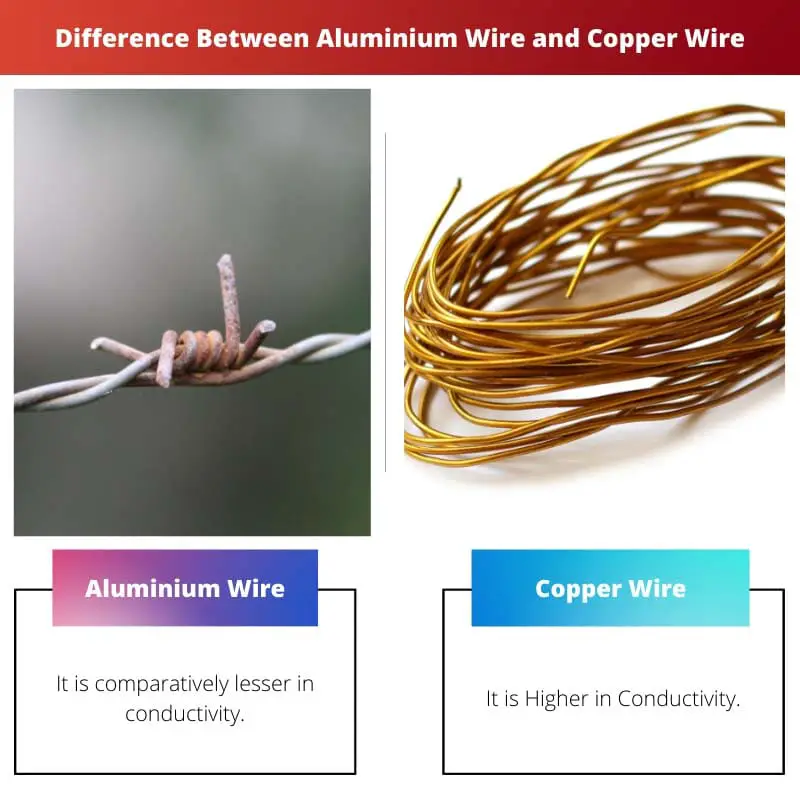Wires are the conductors that are used to conduct electricity or electron flow. Both magnetic and nonmagnetic metals are conductors, but nonmagnetic metals are considered to be the best.
Several metals are used in industries, but the most used metals are Aluminum and Copper. Aluminum and Copper Wire are used for a very long duration and have different properties.
Key Takeaways
- Aluminium wire is lighter, softer, and cheaper than copper wire, while the copper wire is more durable and has a higher conductivity.
- Aluminium wire is more prone to corrosion and can result in electrical fires, while the copper wire is more corrosion-resistant.
- While the aluminium wire is suitable for low-voltage applications, copper wire is better suited for high-voltage and high-frequency circuits due to its low resistance.
Aluminum Wire vs Copper Wire
Aluminium wire is less expensive and lighter than copper wire. Aluminium wire has a higher electrical resistance, which can get hotter and potentially cause a fire hazard. Copper wire is more expensive and heavier but has lower resistance and is considered more reliable and safe to use in electrical wiring. Copper wire is also better for high-frequency and high-power applications.

Aluminum Wires are more economical and lighter, and that increases their usage. The Aluminum Wire cannot be used everywhere due to its corrosive nature. And it is slightly challenging to make wire out of Aluminum due to its less tensile and ductile nature.
Copper Wires can be easily made out of copper as it is more ductile and tensile and can be used in more places, even at high temperatures, but its only disadvantage is its price and weight. Copper Wire is not economical. They are costly and are heavier in weight.
Comparison Table
| Parameters of Comparison | Aluminum Wire | Copper Wire |
|---|---|---|
| Conductivity | It is comparatively lesser in conductivity. | It is higher in conductivity. |
| Weight | It is lighter | It is comparatively heavier. |
| Temperature Resistance | It expands at high temperatures and contracts at low temperatures. | It can resist the effect of thermal changes. |
| Cost | It is comparatively less expensive. | It is more expensive. |
| Ductile and Tensile strength | It is comparatively less ductile and tensile. | It is more ductile and tensile. |
What is Aluminum Wire?
Aluminum or Aluminium Wires are among the most used wires due to their properties and usage.
Features of Aluminum Wires:
- The molecular weight of the wire is 26.98
- The appearance of the wire is silvery.
- The melting point of the wire is 660.37 °C
- The boiling end of the wire is 2467 °C.
- The density of the Wire is 2700 kg/m3
- The tensile strength is 6800 psi cold rolled 16,000 psi.
- The thermal conductivity of the wire is 2.37 W/cm/ K @ 298.2 K.
The Advantages of Aluminum Wire are:
- Light Weight: One of the aluminium wires’ main advantages is that they are lightweight, 2.7 g/cm3, reducing manufacturing costs. This also helps with vehicle use, reduces noise, and increases comfort.
- Ductile: Aluminum is ductile, which can quickly be drawn in thin sheets or wires. For example, aluminium foils are used in every household for several purposes.
- Impermeable: Aluminum is odourless and waterproof, making it the best for packaging edible and sensitive things.
- Nonmagnetic Metal: Nonmagnetic metals are considered the best conductor, and aluminium is one of those metals.
- Reuse: aluminium is a recycled metal that can be reused multiple times.

What is Copper Wire?
Copper Wires are the best conductors due to their excellent features:
Feature of Copper Wires are:
- The molecular weight of the wire is 63.55
- The appearance of the wire is Reddish.
- The melting point of the wire is 1085 °C
- The boiling end of the wire is 2562 °C.
- The density of the Wire is 8.96 g/cm3
- The thermal conductivity of the Wire is 401 W ·m-1 ·K-1.
Advantages:
- Electricity Conductivity: it is best when it comes to electric conductors, due to which it is best for use for cables and transformers.
- Thermal Conductor: it is also an excellent thermal conductor, which is used for ACs, heat sealing machines and television, or anything where thermal power is very high.
- Non-corrosive: copper is considered ideal because it is non-corrosive, which means it doesn’t react, making it perfect for pipes, jewellery, radiators, statues, and many more.
- Ductile: it is more ductile and tensile than aluminium wires.
Although despite all these advantages, the main disadvantage is that it is heavier and more costly.

Main Differences Between Aluminum Wire and Copper Wire
- The Aluminum wire is made of aluminium, and the copper wire is made of copper. Therefore both of them have different properties of their respective metal.
- Aluminium wire is relatively less conductive (only 60% of copper), whereas Copper wires have higher conductivity.
- The Aluminum wires are lighter and easy to carry, whereas Copper wires are heavier and more complex to maintain.
- The Aluminum wires have the property of expanding at a high temperature and contracting at a low temperature, whereas no such changes occur in the copper wire. It can resist the effect of Thermal Changes.
- Regarding ductility, aluminium wires are less ductile, whereas copper wires are more pliable.
- The Aluminum Wires are cheaper, and the Copper Wires are more expensive.
- The Aluminum Wires are less Tensile, and Copper Wires are more Tensile.
- The Aluminum Wires can cause fire due to their corrosive nature, but no such mishappening occurs with the Copper Wires.




